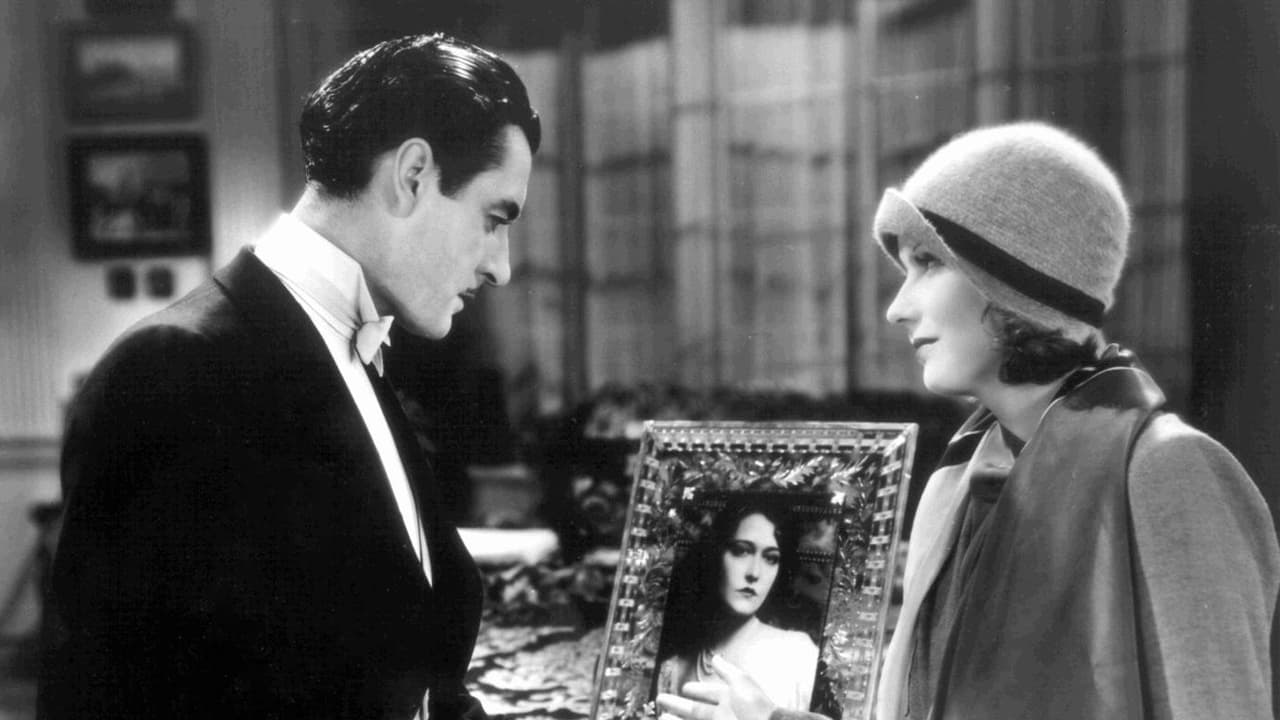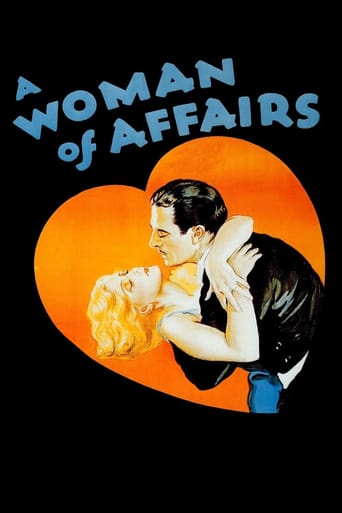

terrible... so disappointed.
... View MoreIt is not only a funny movie, but it allows a great amount of joy for anyone who watches it.
... View MoreThis is a must-see and one of the best documentaries - and films - of this year.
... View MoreThe story-telling is good with flashbacks.The film is both funny and heartbreaking. You smile in a scene and get a soulcrushing revelation in the next.
... View MoreDirector: CLARENCE BROWN. Screenplay: Bess Meredyth. Based on the novel, "The Green Hat" by Michael Arlen. Titles: Marian Ainslee, Ruth Cummings. Photography: William Daniels. Film editor: Hugh Wynn. Art director: Cedric Gibbons. Costumes designed by Adrian. Assistant director: Charles Doran.Copyright 10 December 1928 by Metro-Goldwyn-Mayer Pictures. U.S. release: 15 December 1928. Originally issued with a music score (including an original song by William Axt and David Mendoza called "Love's First Kiss") and sound effects, the film is now available only in a silent version with a new orchestral score composed by Carl Davis. New York opening at the Capitol: 20 January 1929. Current running time: 98 minutes.SYNOPSIS: Childhood sweethearts plan to marry, but the hero's father steps in and, fully intending to nip the romance in the bud, sends the lad off to Egypt. NOTES: Remade in 1934 as "Outcast Lady". COMMENT: Michael Arlen's steamy, best-selling 1924 novel of high society amours incurred the wrath of censors worldwide. It was eventually banned in many countries, including the U.S.A., England and Australia. Hence the movie's title change to the far more salacious "A Woman of Affairs". This is a sumptuous, yet beautifully made film, exquisitely photographed, most inventively directed, and superbly acted by an outstanding cast, not the least member of which, the young Douglas Fairbanks, almost steals the production from the divine Garbo herself. The new Carl Davis score has come in for quite a few brickbats, but I like it. For me, it perfectly captures the romantic mood induced by the story and its principal players. Yes, it's a familiar tale, but it's given a great workout here, thanks to solid acting which brings all the characters to life, really impressive (if mostly unobtrusive) direction and outstanding production values (including Daniels' attractively atmospheric camera-work). Garbo literally lights up the screen, even when her face is partly hidden by the green hat of Arlen's title. Incidentally, screenwriter Bess Meredyth and the caption writers have done a marvelous job condensing Arlen's wordy, over-written prose to the fast-moving story-line, succinct, realistic dialogue and descriptive inter-titles of the movie. As a result, the characters of the film are far more believable than their counterparts in the novel.
... View MoreDirected by Clarence Brown, this Michael Arlen story earned Bess Meredyth an Academy Award nomination for Best Writing, Achievement. The film is an above average Greta Garbo silent with John Gilbert, Lewis Stone, Johnny Mack Brown, and Douglas Fairbanks Jr., among others.The plot follows Diana (Garbo in the title role), the carefree daughter of the Merrick family and sister to Jeffry (Fairbanks Jr.), who grew up the childhood sweetheart of Neville Holderness (Gilbert). Anita Louise appears, uncredited, as the child Diana.Unfortunately for the young lovers, Neville's father, Sir Morton Holderness (Hobart Bosworth), disapproves of the "reckless" Merricks, so he sends his son abroad to prevent his further involvement with Diana. Later, Diana ends up marrying David Furness (Brown), who is not only Jeffry's best friend, but the man her brother idolizes most in the World. Lewis Stone plays Dr. Trevelyan, a friend of the Merricks.Some years later, under a mountain of debt unknown to everyone but his wife Diana, the outwardly proper David kills himself to escape his creditors by jumping out a window. Apparently the police are satisfied with calling it an accidental death, but Jeffry and others suspect that Diana was to blame for her husband's death, especially when she spends the next several years on the arms of many wealthy, or otherwise "society paper worthy", escorts. Besides Diana, only Dr. Trevelyan knows the truth.Of course, a reunion with Neville, now married to the beautiful Constance (Dorothy Sebastian) is inevitable. Their one night stand leads to an ill-fated pregnancy for Diana, and drinking by Neville. Constance, ironically, is curious about Diana's notoriety, and causes another reunion between the former lovers later herself.After the earlier loss of his friend and idol David, Jeffry descended into the depths of depression with drugs and/or alcohol, refusing to see the sister he blames as he takes his last breaths and dies in the presence of Dr. Trevelyan.But the title of this film does not mean what you think or, perhaps more precisely, is actually a double entendre. As it turns out, Diana had actually been settling her husband's affairs (e.g. his debts) over all these years such that, in the end, even Sir Holderness comes to respect her.Back within her presence (caused by Constance's aforementioned fascination), Neville is willing to chuck everything (e.g. his marriage) to be with her. But, out of respect for Constance, Diana leaves their home and drives recklessly towards a tree, killing herself. Dr. Trevelyan had revealed the secret of Furness's debts to Neville and now the entire Holderness family mourns her death.
... View More"Garbo had something behind the eyes that you couldn't see until you photographed her in close-up. You could see thought. If she had to look at one person with jealousy, and another with love, she didn't have to change the expression. You could see it in her eyes as she looked from one to the other. And nobody else could do that on the screen." (director Clarence Brown in a 1968 interview).Perhaps, you may consider it strange of me to quote Brown's memorable words about Garbo under the title of the film which is, most definitely, not the top - famous film with Greta Garbo. Yes, it is true that not many people have seen A WOMAN OF AFFAIRS (1928), comparing its popularity to her other films, like FLESH AND THE DEVIL, NINOTCHKA or GRAND HOTEL. Furthermore, it was not released on DVD in September 2005, on the occasion of her birth's 100th anniversary . Yet, it is one of the most unforgettable films where Garbo's silent performance has a soul throughout. But, at the same time, the movie can also boast marvelous cinematography, great performances from all cast, an interesting content, and the original soundtrack which opens it to a new era of the 1920s cinema, something in between silent and sound films with dialogs. Let's start from the first aspect, CINEMATOGRAPHY. There are shots in this film that leave such a deep trace in the viewer that it is hard to forget them. I was absolutely astonished when I saw the moment where Diana (Greta Garbo) walks down the hill in the garden. The lighting and camera movement make such an effect that you simply admire the whole moment. The light is directed towards Diana's figure walking quickly but desperately after a bitter conversation with Morton Holderness (Howard Bosworth), an honorable father of her beloved Nevs (John Gilbert). Another brilliant scene is the one with flowers. Diana, recovering in hospital from the shock that she went through, keeps flowers by her side which remind her of Nevs. Soon before he comes to visit her, there is a brilliant shot of Diana lying in bed, in the state of delirium, and looking at flowers. She really has a blink in her eyes and the camera is directed towards her as well the flowers that she is staring at... Terrific, brilliant shot! The CONTENT of the movie is based on controversial novel by Michael Arlen, THE GREEN HAT. However, I am not going to compare these two since the film can be watched without the knowledge of the book whatsoever. Since the novel entailed a lot of controversial things, the code made the producers change much, even names. What is more, the credits of the film had no information except "from the novel by Michael Arlen," skipping the fact which novel it was. Therefore, the content was so much changed that the film becomes quite a different story. But, a very interesting one. Except for many things worth attention, I particularly like three aspects about the content. Firstly, it shows the psychological struggle between honor and love, reason and emotions. This clash is most accurately presented in Diana - Morton's conversation at the tree when the elderly gentleman wants to stop the "silly boy and girl attachment" between Diana and his son, Nevs. Morton's character is expressed in another moment when he says to his son trying to convince him to give up the relationship "Ten generations are watching you!" Secondly, the content perfectly shows what a passionate love really means. It is not the matter of choice where I say "yes" or "no" but has a deep insight into the psyche of a particular person. Although Nevs is happy with his wife Constance (Dorothy Sebastian), he cannot stop thinking about Diana whom he has known since the light hearted days of childhood. Thirdly, humorous moments make the rather sad content brighter. Some of them may seem dated, but they are funny in a different way. For instance, the wit about lip rouge is not found in films nowadays. Nevertheless, such script may still be amusing.The PERFORMANCES are absolutely outstanding. It is the third film in which Garbo appears with her real-life love interest John Gilbert and they both give marvelous jobs here. Their relationship is not that intimate and sensual as in FLESH AND THE DEVIL (1926), but it is more "hearty". Garbo gives her best performance when she is hugging the flowers in hospital. She completely opens herself to a viewer and you can read her mind, similarly like in the final shot of her 1933 masterpiece "Queen Christina". Gilbert is an elegant young person who portrays a man divided into two realities - the one of honor and duties and the one of love and dreams. Lewis Stone, a mainstay of most Garbo films (from this one to many others, including GRAND HOTEL and MATA HARI), does a great job as Dr Hugh Trevelyan, who approved of the relationship. Howard Bosworth is magnificent as cruel but honorable Morton Holderness, who disapproved of their relationship. Yet, Dorothy Sebastian gives a delicate performance of a beautiful young wife of Nevs, attempting to be happy and to make other people happy. So with these great performers, you see all of them in the final 10 minute-long scene at Holderness' house, where Diana comes to talk things over with Morton. I don't know how you will react to this, but I consider the scene a masterpiece of silent performances.All things considered, A WOMAN OF AFFAIRS is a highly recommended film which stands out in our modern era of cinema, as an example of cinematography, performances and well selected content. But it is also Garbo, one of the greatest stars of cinema, about whom one cannot forget when planning to see the movie. Indeed, you can see thought when you look at her face. Garbo ... eternal in cinema!
... View MoreA soap opera on the grand scale with the great screen team of John Gilbert and Greta Garbo. Like many "fallen women" of her period, Garbo's not "bad," but "misunderstood."
... View More